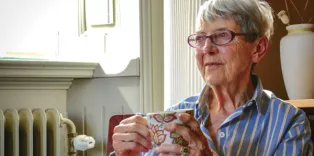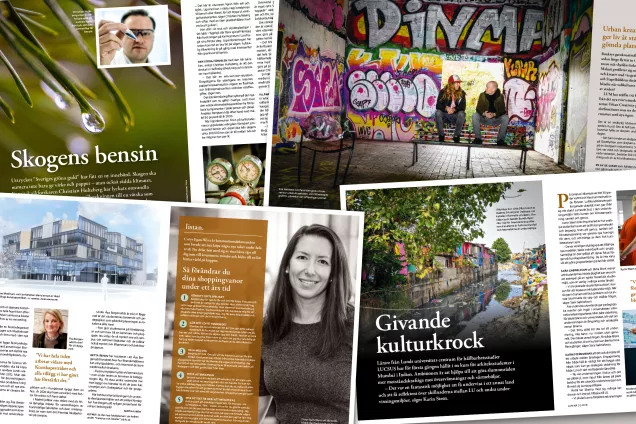“I know so well how the Humanities often lose out and that donations are useful”, says Maibrit Westrin, whose own PhD was in French.
Per Anders and Maibrit Westrin’s foundation awards grants to non-European Master’s students in the humanities, and to book production. Every year, a prize is also awarded to the best degree project in romance languages. Maibrit’s husband, Per Anders Westrin, was a senior lecturer in education sciences and psychology at LU but best known as a translator of Donald Duck comics between 1957 and 1981. However, his wife Maibrit Westrin was also behind the P A Westrin signature on the comic books.
“I was a little more high-brow and didn’t want my name on the Donald Duck comics as an academic, despite many adults, including professors, reading Donald Duck at the time”, she says.
But finding the Swedish equivalents to Donald Duck’s speech bubbles was a tandem creative endeavour for 25 years, from the 50s to the 80s. The couple also translated original comics from many languages other than English, such as Dutch, German, Italian and French.
“In the end, I knew more or less what Donald would say. I drew the line when we received a comic in Turkish; then we said no.”
The Westrins contributed with many clever and humorous expressions in the Swedish version of Donald Duck, such as ‟Långtbortistan” (“Faroffistan”) och ‟uschiamej” (“Yuckymee”). They invented the word ‟läskeblask” (“Fizzyslush”) for a sparkling beverage Donald drank that made him stagger around in an Italian Donald Duck series. That was not acceptable in a Swedish children’s cartoon.
It certainly did not go without saying that Maibrit Westrin would be able to study in Lund. She grew up in Sävsjö, in a family with many children and little money. However, a teacher at the upper secondary school in Eksjö noticed Maibrit’s talent for languages and arranged for her to live free of charge for some of her study time in Lund, at the home of Professor Eilert Ekwall, the well-known toponymist. It turned out that he was born in Sävsjö and happened to be the inspector at Småland nation, where Maibrit naturally became a member and, eventually, the events officer. After her studies, she worked for a time as a senior lecturer at the Romance Languages Department and then at Katedralskolan upper secondary as a language teacher. She says she never needed to raise her voice. That is not hard to believe, if she had even half the natural authority she emanates as a 94-year-old.
She has always been curious and wanted to learn new things, which led her to academia, a world she continues to be a part of today as a donor.
“I get to hear so many interesting things and, what’s more, I get to meet the scholarship recipients”, says Maibrit Westrin, referring to the lovely ceremony with coffee and cakes at which the students and researchers present their research or their degree project.
As a pensioner, Maibrit Westrin has written hundreds of letters in Spanish on behalf of Amnesty International, to presidents, ministers and other decision-makers. Amnesty’s massive letter-writing campaigns put pressure on governments to give prisoners a fair trial.
“I got few answers, but we know that the letters matter”, she says.
She is no longer writing letters but is still active in several associations. After her husband’s death in 2003, she chose to increase her volunteering commitments.
But what is it like to get old?
“Your senses and your strength fade. But I still manage to get out and meet people and listen to music, something that I depend on. Otherwise I don’t know what I would do with myself.”
TEXT & PHOTO: Jenny Loftrup
Facts:
Per Anders and Maibrit Westrin’s foundation started in 2013 with the aim of supporting research in the humanities through the following awards:
- Scholarships to cover tuition fees for Master’s students from outside the EU
- Scholarships for the best degree project in Romance languages – Spanish, French, Italian
- Printing grants for doctoral theses
- Translation grants for translation of Romance language books into English



